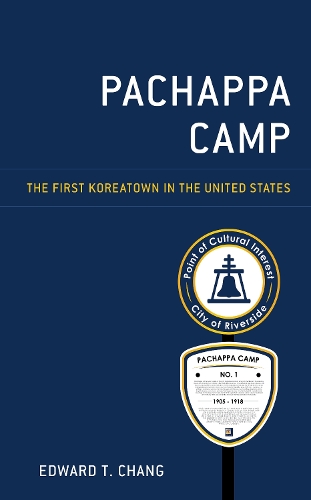
Pachappa Camp: The First Koreatown in the United States
(Paperback)
Available Formats
Publishing Details
Pachappa Camp: The First Koreatown in the United States
By (Author) Edward T. Chang
By (author) Edward T. Chang
Bloomsbury Publishing PLC
Lexington Books
23rd August 2022
United States
Classifications
Professional and Scholarly
Non Fiction
Ethnic groups and multicultural studies
979.497004957
Physical Properties
Paperback
150
Width 164mm, Height 228mm
Description
Through new research and materials, Edward T. Chang proves in Pachappa Camp: The First Koreatown in the United States that Dosan Ahn Chang Ho established the first Koreatown in Riverside, California in early 1905. Chang reveals the story of Pachappa Camp and its roots in the diasporic Korean community's independence movement efforts for their homeland during the early 1900s and in the lives of the residents. Long overlooked by historians, Pachappa Camp studies the creation of Pachappa Camp and its place in Korean and Korean American history, placing Korean Americans in Riverside at the forefront of the Korean American communitys history.
Reviews
Korean American studies scholar Edward Chang brings into view an important cornerstone of Korean American history in this book, which excavates America's first Korean "village," Pachappa Camp in Riverside, California. Affectionately referred to as "Dosan's Republic," this earliest Koreatown was where Dosan Ahn Chang Ho's utopian vision of self-cultivation, honest and respected work, and political activism were developed and practiced.
-- Elaine H. Kim, UC BerkeleyDrawing on a rich collection of historical documents, newspapers, and secondary sources, Pachappa Camp is the first book to analyze the creation and evolution of the very first organized Koreatown community in the mainland United States situated in Riverside, California. Chang frames the history around the early and later years of the famous pro-independence leader Dosan Ahn Chang Ho and shows how the camp is significant not only as a symbolic and institutional site for early Korean families and laborers, but also, as the lifeblood for the Korean American independence movement against Japanese colonization. The book fills a gap in our current knowledge of Korean American history.
-- Angie Y. Chung, University at Albany, SUNYProfessor Edward Chang offers important archival work that illuminates the life and work of Ahn Chang Ho, one of the most important Korean nationalists of the early 20th century. Professor Chang shows how Ahn and other Korean Americans had conceived of the Pachappa Camp in Riverside, California, as a novel experiment for Koreans in the diasporathis would be the place to establish their collective aspirations for a democratic republic in Korea itself, after the Korean monarchy and after Japanese colonialism. For presenting the Pachappa Camp as an important symbol and milestone in Korean and Korean American history, Professor Chang deserves our thanks.
-- John S.W. Park, UC Santa Barbara, Professor of Asian American Studies and Director of the Migration InitiativeAuthor Bio
Edward T. Chang is professor of ethnic studies and founding director of the Young Oak Kim Center for Korean American Studies at the University of California at Riverside.
